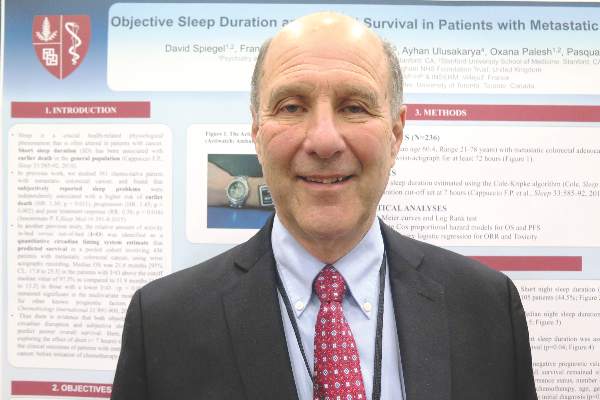AT THE GASTROINTESTINAL CANCERS SYMPOSIUM
SAN FRANCISCO (FRONTLINE MEDICAL NEWS) – Sleep duration influences survival in the metastatic colorectal cancer population, according to a cohort study of 236 patients who wore wrist actigraphy devices for the 72 hours leading up to chemotherapy.
Those who slept 7 hours nightly or less had a 45% higher adjusted 5-year risk of death when compared with counterparts who logged more hours, investigators reported in a poster session at the Gastrointestinal Cancers Symposium.
“If you’ve got advanced cancer, losing sleep is something to lose sleep over. It would be a good idea to view part of your overall health program as making sure you get an adequate amount of sleep,” first author Dr. David Spiegel said in an interview.
“The nice thing about this is, all of our patients could spend almost a third of their lives in bed asleep, and it’s an easy thing to advise them to do and try and help them to do,” he added. “If we had a chemotherapy that had this kind of effect in this setting, we’d be very happy about that. So it’s something we can do that is low risk, no side effects, that can actually have an effect on outcome.”
The mechanisms at play are still unclear, according to Dr. Spiegel, who is the Jack, Samuel, and Lulu Willson Professor of Medicine, Stanford (Calif.) University.
One possibility is perturbation of cortisol levels. “Cortisol has anti-inflammatory effects. Pro-inflammatory cytokines can trigger [vascular endothelial growth factor], which can provide metastatic tumors with more vascular support,” he elaborated. “Cortisol also affects tumor suppressor gene expression… So it’s conceivable that you are having different levels of cortisol throughout the day and night that may have a subtle effect on inflammation or expression of tumor suppressor genes.”
Alternately, short sleep may be a marker for other lifestyle factors negatively affecting prognosis, he proposed. “People who don’t sleep well don’t exercise as well. They may not eat as well. There are a lot of other systems that kind of get triggered,” he said at the symposium, sponsored by the American Society of Clinical Oncology, ASTRO, and the Society of Urologic Oncology.
In previous research, the investigators found that subjectively reported sleep problems in chemotherapy-naïve patients with metastatic colorectal cancer were associated with increased risks of progression, death, and poor treatment response ( Sleep Med. 2015 Mar;16:391-8 ). Additionally, patients with metastatic colorectal cancer with a longer objectively measured proportion of time in bed had better overall survival ( Chronobiol Int. 2014 Oct;31:891-900 ).
In the new study, the median nightly sleep duration was 7.4 hours per night for the entire cohort. Compared with others, patients sleeping 7 hours nightly or less had poorer median overall survival (14.6 vs. 16.4 months, P = .04), and this association remained significant after adjusting for clinical, disease, and treatment factors (hazard ratio, 1.45; P = .012).
“What’s interesting is it’s not simply, as your disease is progressing, you are more anxious, you don’t sleep as well. You are dying anyway, so you are not sleeping well,” Dr. Spiegel commented. “This is a 5-year prediction of subsequent survival. And if you look at the curves, they stay separated pretty much throughout the ensuing 5 years. So it seems to be a strong and independent predictor of mortality.”
In contrast, short sleep duration was not significantly associated with progression-free survival, objective response rate, or grade 3 or 4 toxicity.
The findings are generally consistent with those of a study among women with metastatic breast cancer showing an impact of sleep on survival ( Sleep. 2014 May 1;37:837-42 ). However, in that study, sleep efficiency, not duration, was associated with survival.
“My colleague Oxana Palesh has a brief behavioral intervention for sleep, and it is effective for improving sleep in the short term,” commented Dr. Spiegel. “The next thing would be to do a randomized trial to see if we can get them [short sleepers] to sleep longer and if that has an effect on outcome.”




